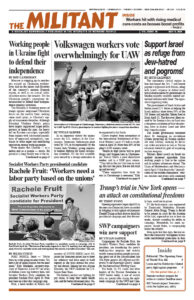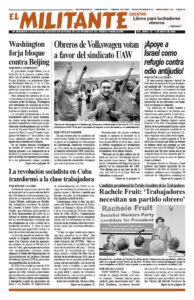In an important victory for unions across the U.S., workers at the Chattanooga, Tennessee, Volkswagen plant voted by 73% to be represented by the United Auto Workers, giving impetus to workers fighting for union recognition elsewhere. It’s the first assembly plant owned by a foreign automaker to be organized in the South.
Cheers erupted from autoworkers at the International Brotherhood of Electrical Workers Local 175 hall as results came in April 19. More than 80% of the plant’s 4,300 workers voted.
“People in high places told us good things can’t happen here in Chattanooga,” Kelcey Smith, a paint department worker, said in a UAW press release. “They told us this isn’t the time to stand up, this isn’t the place. But we did stand up and we won.”
“Union supporters here think the win in Chattanooga is awesome,” Kirk Garner, a veteran union builder at the Mercedes-Benz plant in Vance, Alabama, told the Militant by phone April 21. “The Chattanooga victory is helping us win over people who are still on the sidelines and haven’t yet signed union cards. We’re fired up now.”
Workers at the Mercedes-Benz plant are voting May 13-17 on union recognition after a big majority of the 5,000 workers there signed union cards in less than five months, forcing the National Labor Relations Board to schedule an election.
Previous attempts to unionize at Volkswagen in 2014 and 2019 failed in close votes. Gains made by UAW strikes last fall against Ford, General Motors, and Stellantis, a fight closely followed by millions across the country, won wide support.
The series of strikes showed it was possible to win gains in wages and benefits after years of concessions.
“Five years ago unions weren’t doing any organizing,” Todd Dunn, president of amalgamated UAW Local 862 that includes Ford’s Kentucky Truck Plant, told the Militant. “We sent a message during the recent strike, that now is the time to fight.”
Volkswagen offered an 11% wage raise, hoping to undercut union support. But the company also planned to raise health insurance premiums by 15%.
“Job safety and health care costs are two of the primary issues that workers at the plant hope to address,” Victor Vaughn, a member of the union-organizing committee at Volkswagen, told CBS. “That was a shock to us,” he said of the hike in health care costs.
Tennessee Gov. William Lee also tried to undercut support for the union. On a visit to Chattanooga, he said voting for the union would be a “big mistake.”
He was joined by five other Southern governors in a press release, alleging the fight for the union was organized by “special interests looking to come into our state and threaten our jobs and the values we live by.”
Their words rang hollow, especially after bosses at nonunion Tesla announced plans to lay off 10% of its workforce April 15.
“Our vote shows that workers everywhere want a better life on and off the job,” Doug Snyder, a body worker at Volkswagen, said. “Fair pay is important, but so is time with our families. So is a voice for safety in our plant.”
Fight continues at Mercedes
The election at Volkswagen was closely watched across the South, no more so than in Alabama, one of the top-five auto production states in the country. Some 50,000 assembly workers are employed there.
For Jeremy Kimbrell, a worker in the Mercedes-Benz plant in Vance since 1999, it’s simple. “Why should a worker just because he lives in Alabama be paid less and be treated worse? That’s old-timey thinking,” he told AL.com.
In 2017, Mercedes introduced two tiers of pay and started using temporary workers. This “opened the eyes” of many workers, he added.
Workers in the plant have filed multiple federal charges with the NLRB as the company has carried out an aggressive anti-union campaign in the plant.
“Mercedes is forcing me and my co-workers to attend meetings and watch anti-union videos that are full of lies,” Taylor Snipes, a worker in the plant, says on the UAW website. When he objected, Snipes was told he “had to watch the video or put my head down on the desk.” That day he was fired for having his phone on the factory floor, even though he had permission to check messages from his child’s day care center.
Alabama Gov. Kay Ivey claimed the union drive at Mercedes is a sign that Alabama’s “model for economic success is under attack.”
“She’s talking about an outside party coming in,” Kimbrell said. “We’re the workers, we don’t know what she’s talking about. Let us worry about our business inside our plant.”
Thousands more autoworkers have signed union cards in recent months, with public campaigns at Hyundai in Montgomery, Alabama, and Toyota in Troy, Missouri. Workers at more than two dozen other facilities are actively organizing, according to an April 19 UAW news release.
Susan LaMont in Atlanta and Amy Husk in Louisville, Kentucky, contributed to this article.


